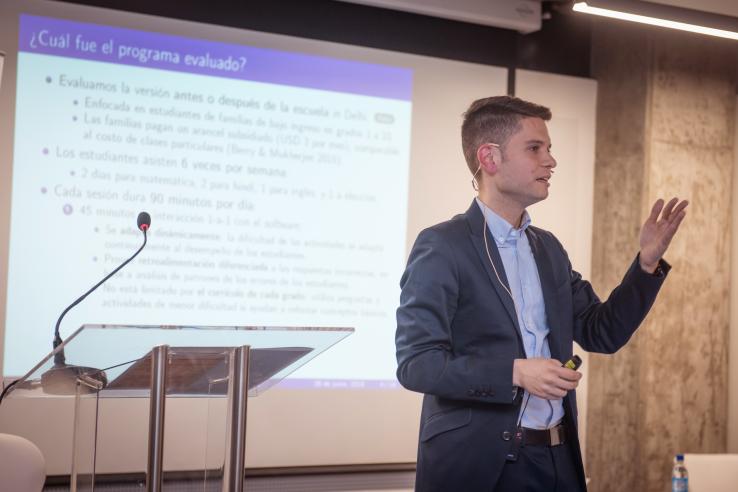
Developing an ed-tech agenda in Latin America

Technology is increasingly opening up new and promising opportunities to improve educational achievement in schools. Governments in Latin America are investing significant resources to adopt education technologies, or ed tech, with the promise of improving learning outcomes. Some of these investments are not evidence-based and risk wasting public resources with ineffective approaches. Despite this, there is strong demand among some actors for data and evidence.
At J-PAL Latin America & the Caribbean (J-PAL LAC), we are frequently contacted by government agencies, NGOs, and policymakers seeking evidence on ed-tech effectiveness. Given this growing interest in the region, this is a critical time to support governments and other partners in their decision-making processes on ed-tech programs to help them achieve real changes in students’ learning.
This summer, J-PAL LAC and Proyecto Educar 2050 organized a regional conference on education technology and its impacts on student learning. The event, funded by J-PAL’s Post-Primary Education Initiative (PPE), was held in Buenos Aires, Argentina on June 28 and 29. We organized the event with two goals in mind: present the most recent and rigorous evidence on the impact of education technologies on students’ learning, and generate opportunities for new partnerships to evaluate ed-tech programs in the region.
To achieve our first goal, Alejandro Ganimian, Assistant Professor at New York University and lead academic for the conference; and Francisco Gallego, Associate Professor at the Pontificia Universidad Católica de Chile and Scientific Director at J-PAL LAC, shared their most recent impact evaluations on ed tech.
In this talk, Alejandro discussed the results of Disrupting Education? Experimental Evidence on Technology-Aided Instruction in India, and Francisco presented the evaluation Books or Laptops? The Cost-Effectiveness of Shifting from Printed to Digital Delivery of Educational Content in Honduras.
Vincent Quan, Policy Manager at J-PAL North America and co-author of a recent ed-tech literature review paper, also outlined the current experimental evidence on the impacts of education technology and discussed policy implications. (Read a blog post from Vincent on the ed-tech literature review.)
In support of our second goal for the conference of generating new partnerships, ed-tech companies and implementers presented their products and programs to participants, and high-level Government of Argentina officials shared their experiences and challenges adopting ed tech in their provinces.
More than ninety people attended the event from six countries, including policymakers, governmental implementers, NGOs implementing or interested in ed tech, software developers, researchers, representatives of international organizations, teachers, and school directors.
We reached an even larger audience online through a live stream, with more than 1,200 people around the world tuning in to view the sessions remotely. This level of interest signals the importance and relevance of this topic in Latin America.
To date, three new initiatives have developed as a result of the two-day conference.
An ed-tech provider in Brazil and a J-PAL LAC researcher launched a research collaboration and are currently designing a new evaluation to test the impact of an app that helps teachers manage their classes.
An ed-tech provider in Argentina is working with us to explore the feasibility of a match with a J-PAL researcher for a future evaluation to test the impact of an app on children’s learning.
And an NGO in Brazil is exploring replicating the conference in São Paulo, with participation from J-PAL researchers and staff.
At J-PAL LAC, drawing on the recent ed-tech literature review, we plan to contextualize the existing evidence to Latin America in order to better understand existing research gaps in the region, and to identify policy-relevant questions for future research.
We know that despite best intentions, not every ed-tech program has real impacts on children’s learning. We are also seeking new partnerships with organizations and governments to rigorously evaluate ed-tech approaches and help partners invest in evidence-based solutions.
Interested in learning more? Watch the individual event sessions and a video summary of the event. To explore an ed-tech partnership with J-PAL LAC, contact Edoardo Trimarchi.
